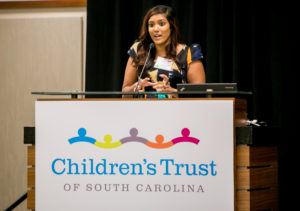Children’s Trust has published a research brief, “Positive Childhood Experiences in South Carolina (PDF),” that details how protective factors and positive experiences can help children overcome adversity and become more resilient.
As the statewide leader in raising awareness about adverse childhood experiences (ACEs) and the lifelong impact such as negative health and social outcomes into adulthood that they can have, Children’s Trust has begun to examine the positive influences that can diminish the effects of ACEs and prevent childhood disadvantage.
This research brief explains how promoting resilience in children, families, and communities through health care, educational, and social service systems can help counteract childhood trauma.

Dr. Aditi Srivastav Bussells, director of research
Aditi Srivastav Bussells, Ph.D., Children’s Trust director of research and a co-author of the research brief, points out how children and families thrive when they have positive relationships and environments.
“The concept of positive childhood experiences recognizes that despite experiencing adversity, children can also experience positive things in their life,” Srivastav Bussells said. “Positive childhood experiences provide us an opportunity to examine what positive or protective things in a kid’s life can actually prevent or mitigate the effects of ACEs.”
The brief explores the importance of safe, stable, nurturing relationships and protective environments, and it notes the difference they can make to a child growing up.
“Understanding the prevalence of positive childhood experiences in South Carolina can also shed light on ways in which we can achieve equity early in childhood,” she added. “It changes the conversation from ‘what’s wrong with you’ to ‘what’s happened to you’ to ‘what’s right with you.’”
Positive childhood experiences are the following.
- Feeling safe and protected at home
- Feeling a sense of belonging in high school
- Feeling supported by friends
- Being able to share their feelings
- Enjoying participation in community traditions
- Feeling supported by family during difficult times
- Feeling that two or more people outside of their family cares about them
Read full research brief (PDF)





